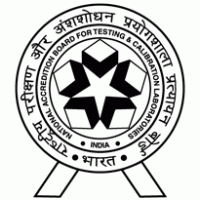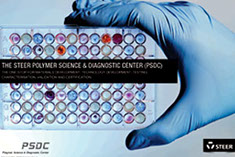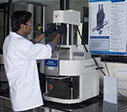
STEER POLYMER SCIENCE AND DIAGNOSTIC CENTER
THE ONE STOP FOR TESTING, CHARACTERISATION, VALIDATION AND CERTIFICATION
Overview
PSDC SERVICES
FACILITIES
GALLERY
 At STEER’s, NABL accredited, Polymer Science and Diagnostic Center (PSDC), we offer expertise across a range of speciality areas that add value to your business, all under a single roof. Whether its materials development, technology development, testing and characterisation, validation or certification, our PSDC caters to the holistic needs of the polymer industry and addresses issues relating to analysis. Besides being a knowledge bank, we partner with various organisations around the world to help create quality compounds and better products.
At STEER’s, NABL accredited, Polymer Science and Diagnostic Center (PSDC), we offer expertise across a range of speciality areas that add value to your business, all under a single roof. Whether its materials development, technology development, testing and characterisation, validation or certification, our PSDC caters to the holistic needs of the polymer industry and addresses issues relating to analysis. Besides being a knowledge bank, we partner with various organisations around the world to help create quality compounds and better products.
EXPERTISE ACROSS A RANGE OF SPECIALITY AREAS
PROCESSABILITY TESTS
To understand the flow behaviour of the material before it is converted into a finished product. These tests include determination of Melt Flow Index and Rheometry;
- Melt Flow Indexer(MFI)*: (7026, Ceast, Italy) helps in the assessment of the average molecular mass and is an inverse measure of the melt viscosity. Knowing the MFI of a polymer is vital to anticipating and controlling its processing. Generally, higher MFI polymers are used in injection moulding, and lower MFI polymers are used with blow moulding or extrusion processes.
- Capillary Rheometry: (RH2000, Malvern, UK:) has its origins in polymer melt processing, but is also directly relevant to many other material processes such as high speed coating and printing applications. Based on controlled extrusion of a test material, capillary rheometry enables material flow and deformation properties to be characterised under conditions of high force (or pressure), high shear rate and at elevated temperature.
SHORT-TERM MECHANICAL TESTS
Including determination of mechanical properties where the effects of long times or cycles are not considered;
- Universal Testing Machine: (with environmental chamber and video extensometer*: (5569 A, Instron, USA) — Also known as a universal tester, materials testing machine or materials test frame, is used to test the tensile strength, flexural strength, lap-shear, trouser tear, stress relaxation and compression strength of materials under ambient conditions as well as at higher temperature.
- Pendulum Impact Tester*: (Impactor II, Ceast, Italy —The test is designed to give information on how a specimen of a known material will respond to suddenly applied stress. The test ascertains whether the material is tough or brittle. A notched or unnotched test piece is employed and the two methods, generally used, are either the Izod or Charpy test.
- Hardness Tester: (Shore A, Shore D, IRHD, egatech Overseas (I) Ltd.) The hardness test is a valuable and widely used mechanical test for evaluating the properties of metals as well as certain other polymeric materials. The hardness of a material usually is considered as resistance to permanent indentation.
EFFECTS OF TEMPERATURE
All physical properties of polymers change with variation in temperature. Plastics melt at higher than ambient temperature; however, melting temperature of different polymers are different and the applicability of different polymers depends on melting behaviour. Therefore, it is extremely important to know the effect of temperature on the plastic materials, especially when those are used at elevated temperature.
- HDT/VICAT*: (HDT6 Vicat, 6921, Ceast, Italy) Measures the deflection temperature of materials under a given load. This property of a plastic material is applied in many aspects of product design, engineering, and manufacture of products.
MAGNETIC PROPERTIES
Measurement of magnetic properties is very important, especially when magnetic particles are added into polymer to impart magnetic susceptibility.
- Magnetic susceptibility Meter (MS3, Bartington): The MS3 enables measurements up to 26 SI, with solution up to 2×10 -6 SI. It comprises a meter with a range of sensors and probes for measuring the magnetic susceptibility of many types of material including soils, rocks, powders and liquids. The system is suitable for use in the laboratory and in the field.
ELECTRICAL PROPERTIES
Electrical properties of polymers, elastomers, composites and plastic films are important to a range of industries like automotive, aerospace, construction, marine, packaging and consumer goods. Electrical tests are measurements of the resistivity, conductivity or charge storage either on the surface or through the material.
- Four Probe Resistance Meter: (i) Four Probe Arrangement with built-in RTD sensor & PID controlled Oven, (ii) D.C. Microvoltmeter, Model DMV-001, (iii) Constant Current Source, CCS-01 —Range: 0-20mA & 0-200mA. For low resistivity samples like thin films of metals and alloys (iv) Low Current Source, Model LCS-02 — Ranges: 0-2A, 0-20A, 0-200A & 0-2mA, for highly resistive samples like thin films of polymers etc. Complete in all respect.
MEASUREMENT OF MOISTURE CONTENT
Moisture affects the morphology and mechanical properties of polymers. Moisture content of compounding ingredients should be well within the specification, as higher moisture content may adversely affect the performance of the polymeric goods.
- Moisture Content Analyzer: (MA 150, Sartorius) — The MA150 infrared moisture analyzer features a compact design along with flexibility of use. Their program memory enable efficient moisture analysis even for a large number of different samples and is therefore optimally designed for use in inspection of incoming goods and quality assurance.
SPECTROSCOPY
The interaction between matter and radiated energy. Data is represented by a spectrum, a plot of the response of interest as a function of wavelength or frequency. It is a useful technique to identify unknown materials.
- FTIR: (Frontier, Perkin Elmer): Helps identify the polymer through the detection of functional groups present in its back bone.
- Colour Matching Spectra photometer (BGD556, Aadarsh- Bieuged): is basically used to determine the value of DE, DC, DH, L, A, B and C, for all Polymer, paints and liquids in both SCI and SCE mode. This machine also measures yellowness and whiteness index for polymers and powders besides being useful to check the colour consistency from batch- to-batch.
ENVIRONMENTAL RESISTANCE
These tests evaluate the resistance of polymers to environmental conditions other than temperature and air. Liquids which have no significant effect on polymers in unstrained conditions can cause severe effects under strained conditions which results in failures.
- Environmental Stress Cracking Resistance Tester: (ESCR, 6947, Ceast, Italy): used to determine susceptibility of polymers to environmental stress cracking when subject to certain conditions.
MEASUREMENT OF MASS, DIMENSIONS & DENSITY
These are the most frequently done measurements in testing labs. They could be used as routine measurements for quality control or for checking of consistency or as essential parts of other physical tests.
- Mass and Density Balance (METTLER TOLDEO)
- Vernier Calipers (Mitutoya)
- Micrometer Screw Gauge (Mitutoya)
SAMPLE PREPARATION
an integral and an important part of testing and characterization. Careful and consistent sample preparation is necessary since most mechanical and physical properties vary significantly depending upon ways of sample preparation.
- Injection molding machine (L&T, India)
- CNC milling machine (Minicut Vis, Ceast, Italy)
- Hollow die punch (6051, Ceast, Italy)
- Notch cutter (6964, Ceast, Italy)
- Sample conditioning chamber
- Hydraulic die punch (193, International Equipments
- Centrifuge (R-24, Remi Instruments)
- Sonicator (DT-151, D-Tech Instruments)
FULLY EQUIPPED STATE-OF-THE-ART CENTERS OF RESEARCH AND DEVELOPMENT.
- Equipment to check Processability
- Measurement of Mechanical Properties
- Thermal Characterisations
- Measurement of Heat Deflection / Softening Point
- Flammability Tester
- Environmental Stress Crack Resistance Tester
- FT-IR Spectroscopy
- Colour spectra photometer
- Magnetic Susceptibility meter
- Equipment to measure Mass, Dimensions and Density
- Equipment for Moisture Content analysis
- Injection Moulding Machine for specimen preparation
- Equipment for sample preparation.
CONTACT
For any additional information on testing, characterisation and validation or on STEER’s Polymer Science & Diagonostic Center (PSDC), write to us at info@steerworld.com
Download Brochure

STEERとは
STEERは、プラスチック、医薬品、食品および栄養補助食品、生体材料とバイオリファイナリーの分野にて、効果的に変換、機能化することが出来る先端材料のプラットフォーム技術のクリエイターです。
認証
ISO9001および14000の認証済み企業
グローバルコンタクト
STEER インド
電話番号:+91-80-23723309 / 10
+91-80-42723300
STEER 日本
電話番号: +81-03-6206-4171
STEER アメリカ
電話番号: +1-866-984-1800
STEER 中国
電話番号: +86-021-34718598
STEER 欧州
電話番号:+44 2032904949
© 2015 STEER Engineering Pvt Ltd























